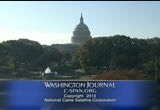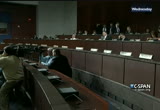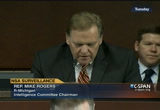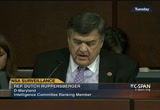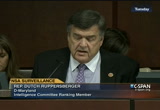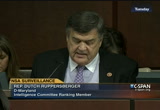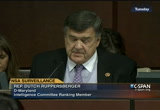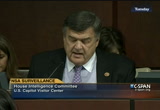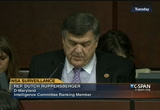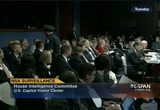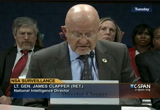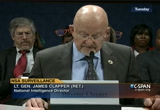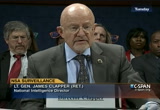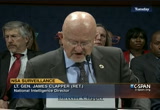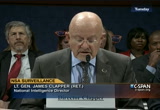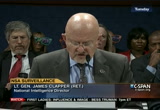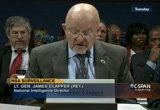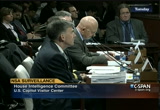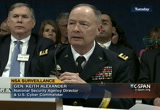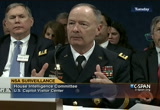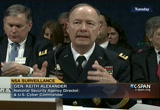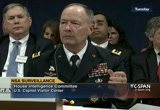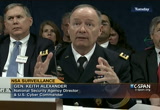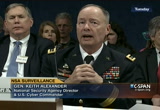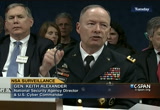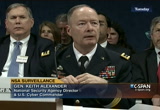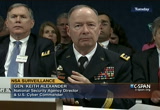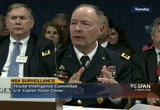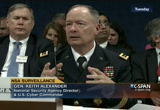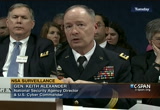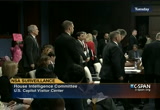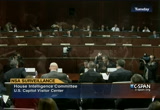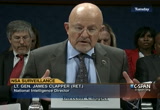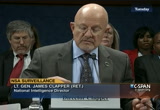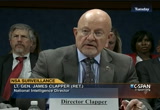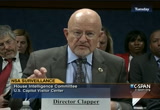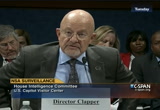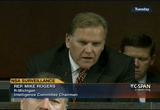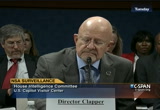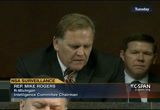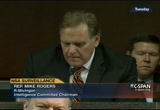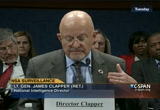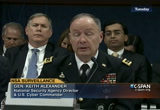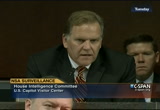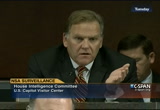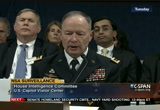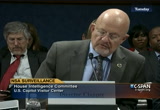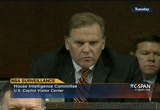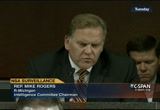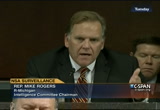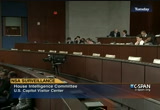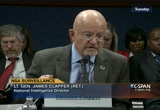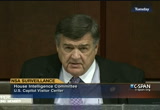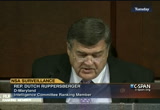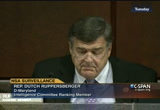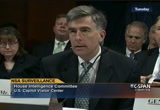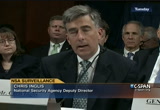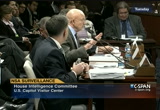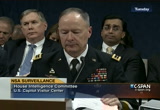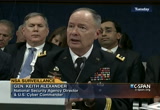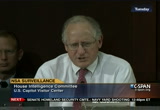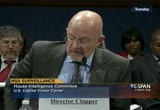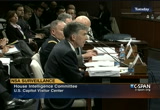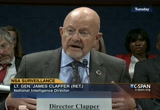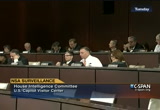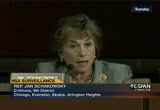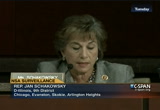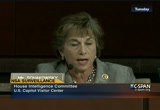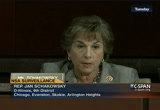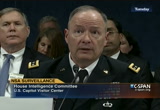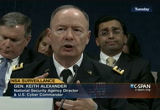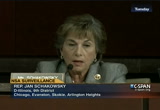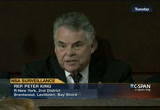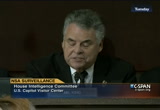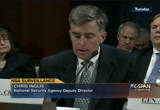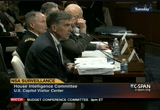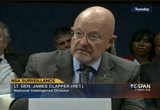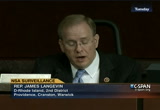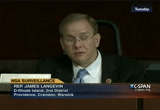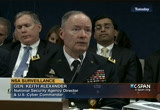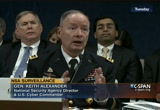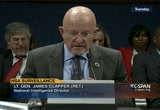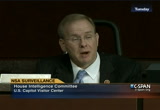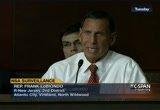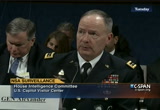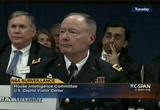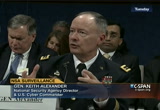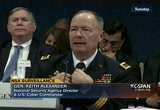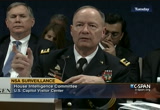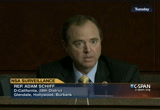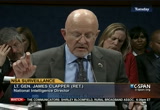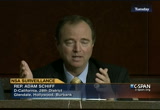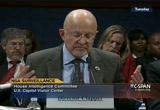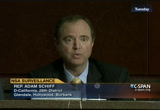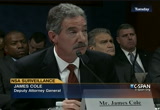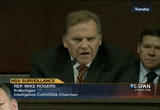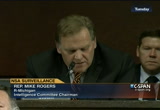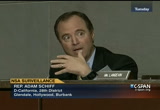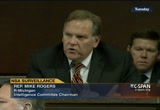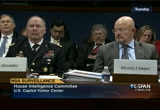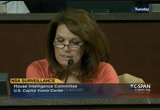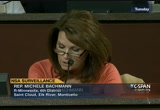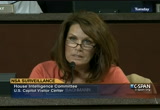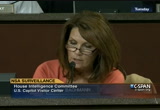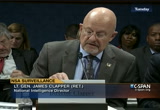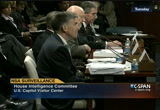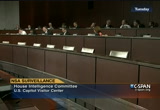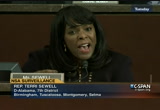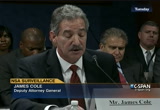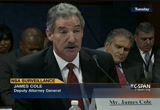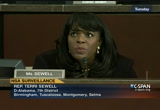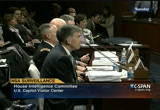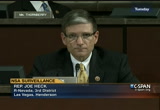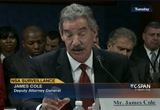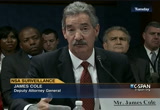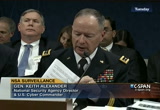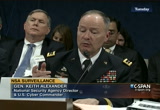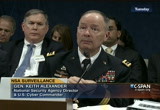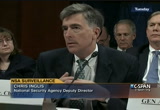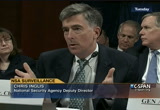tv Washington This Week CSPAN November 2, 2013 10:00am-12:01pm EDT
10:00 am
10:01 am
officials testify on national security agency surveillance programs followed by a hearing onthe washington -- shooting -- the shooting at the washington naval yard. next, the house intelligence onmittee hearing testimony the national security agency intelligence programs in the u.s. and abroad. witnesses included national intelligence agency director james clapper and homeland security department officials. this hearing is two-and-a-half hours. >> i remind all guests that i will only accept civil the koran and only those recognized to speak will be allowed to speak andhe core him --decorum
10:02 am
only those recognized to speak will be allowed to speak. i would like to recognize our first panel today. director of national intelligence james clapper james clapper,, deputy attorney the deputyes cole, director of the nsa, chris inglis. we will move immediately into the second panel of non- governmental experts knowledgeable on fisa issues. we will discuss possible changes to the way fisa applications are handled by the department of justice. i hope all of our witnesses will give clear answers about how proposals under consideration at congress would affect the nsa's ability to stop terrorist attacks. i am going to submit my
10:03 am
statement for the record in order to ask some questions following the opening statement and your opening statements in relation to some of the news of the day to get some things clarified for the record. it will be important for the american people. .e do expect a vote we will hold as long as we can. we will take a brief intermission. there are only two votes. we should be able to recess or a short time and return. i will recognize any opening comment. for comingu, panel, here today. hopefully, we will get the facts on the table and let the american people understand what we do and how we do it. i want to thank the people of the intelligence committee -- community who work every day to protect the security of our nation. if all the criticism leveled at
10:04 am
these programs, it is important that we not forget these men and women are doing what we told them to do within the confines of the laws of the united states of america. the most important thing is to let the public know the facts so we can engage in to reform while maintaining the necessary capabilities to protect our nation. there has been a lot in the media about this situation. some right, some wrong. much has been mischaracterized, which is not helpful for those of us serious about privacy and national security. after these leaks came out, we are urged the intelligence committee to release more information to help the public understand, which they have done. today, we are holding this open hearing so we can continue to get out the facts to the american people can hear directly from the intelligence committee and outside legal experts. one key fact we need to keep in mind is that nsa's focus is on
10:05 am
foreign threats. under fisa, nsa does not target americans in the u.s. or anywhere else without a court order. there are two pfizer authorities highlighted in the press. the business records -- fisa authorities highlighted in the press. the business records act to collect metadata, but no content. let me be clear. under 215, the nsa cannot listen to anyone's phone calls. 215 allows the government to connect the dots. these dots should have and could have been connected to prevent 9-11. havethis tool, we could determined that one of the hijackers was in san diego and made a call to a known al qaeda number in yemen. i shudder to think what connections would be missed if the program were completely
10:06 am
eliminated. the nsa uses these records to fight crime and keep drugs out of our country. make it easynt to to keep terrorists and criminals in our country. allows theauthority government to collect content of e-mail and phone calls of people located outside the united states. theauthorities allowed united states to get information about terrorism. this authority inhibits the targeting of american citizens or u.s. permanent residence without a court order no matter where they are located. both of these authorities are legal. congress to approve and reauthorize to both of them over the last two years and no court has ever struck them down. the nsa is also subject to layers and constant oversight from the judicial and legislative branches of government.
10:07 am
more needs to be done. the foreign intelligence surveillance act must be reformed. we have notified stakeholders to evaluate and effect a range of options. we must improve transparency, privacy protection, and restore the public's confidence. you cannot have privacy without security or security without privacy. we will require a declassification review of any the --decision -- pfizer fisa decision. can viewrs of congress the classified reporting about the programs. a measure that would appoint a presidential he inspector general to add an extra independent check. we are trying to change the makeup of the pfizer --fisa --
10:08 am
fisa court. a non-executive branch lawyer would provide significant interpretation of the fisa law. challenging is changing how section 215 is implemented. we moveove away -- can toward a system used in criminal prosecution where phone numbers and no content can be used to link analysis? we would like to hear your thoughts on these proposals. we brought you here to get your input in an open forum and allow the american people to hear your responses for themselves. i look forward to our thoughtful discussion. mr. chairman, i yield back. >> we welcome the panel today. the rector clapper -- director
10:09 am
clapper, the floor is yours. mr. chairman, i will go ahead with our repaired statements on isaiah -- pfizer -- fisa legislation. thanks so much for having us here today. there are continuing dramatic be removed. i asked the officer to remove. if i see one more example of i will ask you all to be removed. >> you said nothing about
10:10 am
science. i listen to your opening statement. >> and about the steps we are taking to protect our national security interests. i will began and then transition to general alexander. ofs hearing is a key part the discussion our nation needs to provide the intelligence authority toh protect privacy and civil liberties. all of us in the intelligence committee are aware that unauthorized disclosures have raised serious concerns that you alluded to here in congress and across the nation about our intelligence at the release. the nation wants to know how the intelligence community uses its authority and if we can be trusted to use them appropriately. we believe we have been lawful
10:11 am
and the rigorous oversight has been effect it. we welcome this opportunity to make a case to the public. as we engage in this discussion, it is important that our decisions no that the details of these programs has been extremely damaging. these disclosures are threatening our ability to conduct intelligence and keep our country safe. erase or makey to up for the damage that has already been done. we anticipate more as we continue our assessment. before these unauthorized disclosures, we were conservative about discussing the specifics of our collection program based on the truism that the more adversaries know about what we are doing, the more they can avoid our surveillance. thedisclosures have lowered threshold for discussing these matters in public. to the degree we can discuss them, we will.
10:12 am
the public discussion should be based on inaccurate understanding of the intelligence committee. the mannerw months, in which our activities have been characterized have been inaccurate, misleading, or some combination thereof. those people realize the intelligence community exists to collect the intelligence that exists to protect our nation from for rent threats. -- foreign threats. we do not spy unlawfully on americans or on the citizens of any country. we only spy for valid intelligence purposes as authorized by law with multiple layers of oversight to ensure we do not abuse our authority. this reality has been obscured in the current debate. for some, this has led to an erosion of trust. we understand the concerns on the part of the public.
10:13 am
i am a vietnam veteran and i remember that aggression oh investigations of the 1970s -- i remember the investigations of the 1970s without proper authorization or oversight. having lived through that as part of the intelligence committee, i can't ensure the american people -- can ensure the american people that the intelligence community is no longer like that. another useful historical perspective is during the cold war, the free world and the soviet bloc had mutually exclusive telecommunications s.stem now world telecommunications are unified, intertwined with hundreds of millions of innocent people conducting billions of innocent transactions. ofre are a smaller number nefarious individuals looking to
10:14 am
do harm. our challenge is to distinguish between these two groups of communications. we have an alarm bell -- if we had an alarm bell that went off when one terrorist communicated with another terrorist, our job would be easier. over the past months, i have publicly released a series of documents related to section 215 of the patriot act and section 702 of the foreign intelligence act. we are doing that to inform public debate about the programs that operate under these of lord is. in light of the unauthorized about thes, the -- programs that operate under these authorities. these documents let our systems see the rigor with which the fis a court exercises its responsibilities. sa is committed to
10:15 am
recovering, reporting, and correcting -- the nsa is committed to recovering, reporting, and correcting. we will continue to declassify more documents. that is what the american people want. it is what the president has asked us to do and it is the only way we can reassure our citizens that the intelligence committee is using his tools appropriately. the rules and oversight committee asked us to protect our people's liberties. -- we only work within the law. we have made mistakes. these are usually caused by human error or technical problems. whenever we have found mistakes, we have corrected them. the national security agency is
10:16 am
physically as part of the intelligence committee broadly. it is an honorable institution. the men and women who do this sensitive work are honorable people. they are appalled by any wrongdoing. they are citizens of this nation who care just as much about privacy and constitutional rights as the rest of us. they should be commended for their important work in protecting the people of the country, it has been made all the more difficult by unauthorized disclosures. we stand ready to work in partnership with you to further protect our privacy and civil liberties. there are some principles we already agree on. we must always protect our sources and liaison relationships. we must help the american people understand what we do, why we do it and the rigorous oversight that helps insure that we do it correctly.
10:17 am
we must demonstrate our commitment to respecting the civil liberties and privacy of every american. he also have to remain mindful of the potential long-term impact of over correcting the authorization granted the intelligence community. as americans, we face an unending array of threats, more than i have seen in my 50 years of intelligence. balance discussion. situationan either or . we need to continue to protect both. with that, let me turn to general alexander. >> thank you for the opportunity to provide opening comments today. i have a prepared statement. many of you know i will not he able to read it as well as i can tell you what is on my mind. i will talk from the heart so
10:18 am
that you will know what we are talking about from an nsa perspective. i have had 8 years at nsa. they are among the finest people in this country. what they do every day for this nation is unheralded. . we do not get a lot of fanfare, but it is absolutely superb. saturday, i had the opportunity again, which we have done every week i have been there, to support our troops in afghanistan. we do that all the time. ourpeople are supporting troops and the military operations. in eight plus years, not one person has ever come up to me and said, i have to work tonight or the weekend. they always come in and they protect our troops and they protect this country. they have taken an oath to defend the nation and to protect
10:19 am
our civil liberties and property. a do that better than anyone i have ever seen. it is a privilege and honor to work next to them every day. what i want to tell you about is how did we get here, talk about fisa.usiness record i want to talk about the compliance and how we protect these programs and where we need to go in the future. we will dress some of the questions. .irst, how did we get here 9-11. i remember those men running up the stairs to save people. we have those great pictures of
quote
10:20 am
a fireman handing a flat to the military. we deployed our forces to iraq and afghanistan. was -- n deployed 6000 sa has deployed 6000 people. what they bring to that fine helps bring back more of our soldiers, airmen, and marines. you only have to ask people like general david petraeus. they will tell you our people were there every step of the
10:21 am
intelligence agency is expected to see. prior to 9-11, we had no way of collecting those dots. nsa would see one side and the fbi the other. how can we connect these dots and do it in the least intrusive manner. , the senate, the executive branch, and the courts, we have programs to do that. you for yourthank comments. the statements you have made are greatly appreciated. and in then at nsa military
10:22 am
look at the program we have. citizens, everyone at this table is also an american citizen, have agreed we would take our personal data and put it into a lockbox. it would only be looked at when we had reasonable and articulable suspicion that we had connection to a former -- foreign al qaeda or terrorist- related group. in 2012, we had 288 such selectors that we could go and look into that. that is it. of the billions of records, only 288. with that, we had tremendous oversight. when you look at the amount of oversight from this committee alone and from others, from the department of defense, our own director of compliance, our own ig and all
10:23 am
of our compliance individuals at every level, everything we do on this program is audited 100%. 100%. the data is kept separate from all the other data we have. i think it is important to understand the leaker did not have access to this data. period. safeguards we have ensure that no one else gives access to it and no one can get a query unless it goes through those 288 numbers, the numbers currently on the list. only 23 people at nsa are authorized to approve numbers. about 30 are authorized to look into that database. would you look at the number of people we have and the oversight and compliance we have on this
10:24 am
program and what it does to protect our civil liberties and privacy, we could not in covenant better way to do that. i think this is important for our country to think about this. if you look at trends in the arena and 2012, it was the highest globally and has been ever. over 15,000 people killed. month, 2336 last injuredere killed, 1510 and pakistan, syria, iraq, and nigeria. there has not been a mass casualty here in the u.s. since 2001. is not by luck. they did not stop hating us. were justot say they going to forgive this. they continue to try. it is the great members in the intelligence community.
10:25 am
, our military, our law enforcement who stood up and said, this is our job and we do it with our partners and our allies. it has been a great partnership. when you look at the numbers we gave you about the numbers of terrorist-related offenses we have stopped, we called it 13 in the u.s., 25 were in europe. it is easier to get to europe and they are going after them. it is a privilege and an honor from the united states' perspective to know we have re.ped stop incidents the one incident was called 9-11. we call that one incident. that should never happen again. that's what we are about here. that's what we're trying to do. it's also important to note that
10:26 am
we have asked industry's help. more accurately, we have compelled industry to help us in this manner. by court order. what they're doing is saving lives. they're being penalized because they are helping save lives and our way of life because people -- so that people sitting behind me can express their feelings. that's something we all stand up for so that they can say what they believe. we think it's important that they have the facts. has helped because they are compelled to help. there are a lot of patriots out there who know what they are doing is saving lives. it is the right thing to do. it's done under court order. i think it's absolutely vital that we understand that.
10:27 am
where do we come from? 8 plus years. we have been a team for 7 plus years. this is the greatest workforce i have ever met. these are patriots who every day come to work saying, how can we defend this country and protect our civil liberties and privacy? nothing that has been released has shown were trying to do something illegal or unprofessional. when we find a mistake, a compliance issue, we report it to this committee, to all our overseers, and we correct it. in a business record fisa and 702, there have been no willful violations. there have been 12 over a decade. the majority of those were done in foreign space over four -- on foreigners.
10:28 am
for our foreign partners and allies, we hold ourselves to that same standard no matter if we operate here or abroad. if we do something that does not fall within an intelligence requirement, it is wrong. we report it. he hold our people accountable. if they did that willfully and disobeyed orders, they're held accountable. most all of those people are gone. three of them were military. two of those were given a court- martial, reduced in rank, half a month's pay for two months and extra duty. we hold our people accountable and we report to this committee everything we're doing. to go forward in the future, one of the things we talked about -- this is a tough time for nsa where everybody says what are you doing and why are you doing it?
10:29 am
when we get together, we actually say it is much more important for this country that we defend this nation and take the beatings that it is to give up a program that would result in this nation being attacked. we would rather be here in front weyou today telling you why defended these programs than having given them up and have our nation or our allies be attacked and people killed. the interesting part is, we have shown we can do both. defend the country and protect our civil liberties and privacy. chairman, ranking member, it has been an honor and a privilege to work with this committee even though at times you wire brush us. you know we will tell you the truth, the whole truth, and
10:30 am
everything we know. that is our commitment to you. that is our commitment to this country. myt in this -- that ends remarks. >> i will remind members that we will recess at the call of the chair five minutes after the second vote we will reconvene. i asked that we escort our panelists to the green room. >> what about our privacy. what about spying on our allies. that is ridiculous. lies, lies, and more lies.
10:31 am
10:32 am
things to see if we cannot get clear. can you tell me how the intelligence committee set this collection priority? yes, chairman. it is centered around the national intelligence priority a documentthis is and a process that existed in its current form since 2003. it started during the bush administration. administration has had some form of overarching intelligence requirements documents. the current version is called nips- -- nipf.
10:33 am
10:34 am
that process -- there are updates done once each quarter. the totality of that is made available to both of our oversight committees. that is how it works. would the cia or the nsa the able to go out and establish its own collection outside of the framework? >> absolutely not. part and parcel of the system is to ensure discipline. policymakersat the have asked us to do. there is a resource implication. going to do things extemporaneously if we are going to eat up resources.
10:35 am
scarcer. are getting been chairman of this committee, we have had 294 events just with the national security agency alone. have they misled the committee on the parameters of going outside the parameters of the national intelligence priorities framework? >> i am not aware of a case of that at all across any of the collection disciplines. it be fair to say the white house should know what those collection priorities are? >> they can and do. extend down to the level of detail. we are talking about a huge enterprise with thousands and thousands of individual requirements. whatn't necessarily review
10:36 am
the forthcoming collection deck is for tomorrow or which as said is recruiting which source or which selector is being used to fulfill specific requirements. at levels below the white house or the national security staff area -- national security staff. intelligence production. that is what they used to tune the requirements, to update them until we find -- and to refine them. plans and intentions of foreign leaders would be important for the united states to know. far -- is a perennial as as long as i have been in the intelligence business. indership intentions whatever form that is expressed
10:37 am
is a basic tenant. >> why would -- that is a basic tenet. >> why would that be important? >> to determined, from a determine,e -- to intelligence perspective, what is going on. where a country is coming from, what their policies are. it is not just leaders themselves. it is what goes on around them and the policies they convey to their governments. in my time since being in , is business as an fbi agent have found that the best way to determine a foreign leader's intentions is to somehow get close to a foreign leader or to
10:38 am
get him indications of a foreign leader. would that be accurate? >> yes, it would. is this something new and different that the intelligence committee might try to target foreign leaders' intentions to try to determine what the best policy might be for the united states of america? thing ithe first learned in intelligence school in 1963. leadership intentions, no matter what led -- level you are talking about. believe the allies have conducted any kind of espionage activity against the united states of america, our intelligence or otherwise? >> absolutely. >> are you familiar with a story from the former french head of the dcri? >> that is the french domestic
10:39 am
intelligence organization. >> let me read you a quote. i am amazed by such disconcerting naïveté. you'd almost inc. our politicians don't bother to read the ports they get from their ourlligence -- think politicians don't bother to read the reports they get from their intelligence department. say, some of this reminds me of the classic movie casablanca. my god, there is gambling going on here. it is the same kind of thing. alexander, in your experience as director of the security agency, have allies in the united states engaged in anything that you call and espionage act toward the united states of america?
10:40 am
>> yes, they have, chairman. >> that would be consistent with most of our allies. let's pick a place. the european union. , it would, chairman. >> this is ongoing today. it did not stop last week or two years ago to the best of your knowledge? >> to the best of my knowledge. >> the ongoing intelligence activities at all levels that members of congress go through that our policy folks overseas go through is still up to date and consistent and we should all espionagenst activities including when traveling amongst our allies in the european union. is that correct? >> that is correct, chairman. ?> mr. clapper >> i agree.
10:41 am
this is standard fare for anyone who travels overseas. the emphasis i have tried to place on our own counterintelligence resources, which i believe are still underfunded. >> this may be out of your bounds. that theiking to me parliamentary members who come in good faith and have discussions on these issues are not only aware of what their to.lligence services are up is that consistent with your career since 1963 when you talk about overseas intelligence services and their operations and how they are compartmentalized away from their legislative body? >> absolutely, mr. chairman. that comports with my experience. often times policymakers who come and go may not have familiarity with exactly how their intelligence operations work. i would also tell you there is
10:42 am
no other country on this lannett that has the magnitude of oversight or intelligence enterprise as we do. to that end, if i can, mr. alexander, there was some reporting that the story about french citizens being spied on slide that was leaked concluded that french citizens were being spied on. can you expound on that a little bit? specifically, by the national security agency. >> the assertions by reporters in france and italy that the nsa collected tens of millions of phone calls are false. they cited evidence and screen tools -- shots from a web
10:43 am
used for data management purposes. did noton who used it understand what they were looking at. it displayed the totals in several different or mats. the sources of the metadata included data legally collected by nsa authorities as well as by foreigned to nsa partners. to be perfectly clear, this is not information we collect it on european citizens. it represents information that collected nato allies in defense of our countries and in support of military operations. i understand you correctly, this information was collected external to the country of which it was reported in defense of operations in which nato participates. is that correct? >> that is correct.
10:44 am
>> as you study the networks of aboutrld -- let's talk the european union for a second, if i may. is it possible for chinese intelligence services to use networks you would find in any nation in the european union? >> absolutely. >> how about russian intelligence services? networksy use european inside the european union? >> yes. >> how about al qaeda? could they use networks found in the european union to plan execution of operations? >> they could absolutely. it be in the purview of the national security agency to try to prevent those activities if it was targeted at the united states or one of our allies? >> it is and it is something we share with our allies.
10:45 am
collect information and share it with our allies in a way that was appropriate. is that correct? >> that is correct. it may not be collected in europe because it is a global network. in europe or the middle east or in asia or in the united states by a fisa warrant collected by the fbi. they share information sometimes with us. >> they do, mr. chairman. >> the accusation that the national security agency was collecting information on these citizens of the perspective nationstates -- i want to get on the record again -- is false. that did not happen. >> those screenshots that lead people to believe the nsa or the united states collected that information is false.
10:46 am
it is false that it was collected on european citizens. it was neither. it certainly has created an international row. very poor and in accurate reporting. something that we are going to have to deal with here in the future. i'm glad you clarified that. , given theapper recent row about leaders that may or may not have been it and numbers that may have been collected by the national intelligence services, would that information find its way to the national security council in the white house? >> it certainly could if you are speaking -- i would rather not speak specifically, but speaking in totality, leadership intentions are an important
10:47 am
the landscape out there for all policymakers whether in the white house or elsewhere. >> given the likelihood that the intelligence committee and the house intelligence committee was aware of information that may be of value on any foreign leadership intention or plan, wouldn't it logically be that the administration would have that information? they may not have information specifically related to a specific selector or any specific collection target. what they would see is the in its totals dimension. around theancing bush. if there were specific outputs on any of that -- we are talking almost hypothetically -- it would be by a trained intelligence professional who would clearly understand that
10:48 am
maybe the intelligence services were halloween the national intelligence priorities -- following the national intelligence priorities framework. >> correct. onto the going to get privacy issues. i am concerned about where we are that we have decided we will name our intelligence services at the earliest opportunity as the bad guy in the process of trying to collect information lawfully and legally with the most oversight i have ever seen. we are the only intelligence service in the world forced to go to a court before they even collect on foreign intelligence operations, which is shocking to me. the very folks who have no view into their intelligence services have been screaming the loudest, including some in the united states. i hope we shake ourselves out of this when we look at syria in boiled in a proxy war.
10:49 am
the world that china is threatening our pacific allies. iran is aggressively working toward a nuclear weapon. the middle east is collapsing in front of us heading toward and a way welence have never seen in the history of our country. folks trying to find their way allies and european the united states. operating in every sector, every country of the globe. proliferators of chemical and radiological materials that keep us up at night working in every major nation state in the world. thata little taken aback we have decided our intelligence services are to blame for what we have found again and again and again is absolutely inaccurate reporting. if we are going to have this debate, and we should, we should do it on the facts presented
10:50 am
before us. general alexander put it has. he can bring out the wire brush and we have done it. forward is to make sure our programs are protected and the people who have taken oaths are not demonized. this is a time for leadership. this is not a time to apologize. i hope you will pass along to the individuals that hopefully they can keep doing the work and we will fight out the politics. we know that 9-11 road was paved with a lot of good intentions and we should not walk down that road again. as far as the questions are concerned, number one, i believe we need to increase transparency and regain the public's confidence. this is to release
10:51 am
more information about the programs and process. , who you believe we can declassify fisa court decisions in a way that is the american public more insight into what is legally allowed and what is not? >> i do. we have, in concert with the interagency, nsa, and the department of justice, released a lot of documents. over 2000 in the last two or three months. there are certain caveats. we want to make these as transparent and available as possible. we want to ensure we protect sources, methods, techniques, liaison partners. aveatshose copy outs - c mind, i agree that
10:52 am
we should and we have been doing so. question. all of these programs are subject to executive, judicial, and executive branch oversight. we are looking to see if we can do more to be more transparent. general allen xander, do you feel a presidentially important -- general alexander, do you appointedesidentially inspector general is necessary? >> i do not think it will hurt. i do not think it would have stopped what has happened. i do not oppose that. anything that will show we are being transparent is a step in the right direction. >> that is where we are really going. based on the testimony we have here and the oversight the i feelee has had, strongly that the men and women who work in the intelligence
10:53 am
committee are following the law based on the procedures and processes and leadership we have put in place. it is extremely important that we get back the confidence of the american people. with a lot of the media that has been out there, a lot of the media has not been based on fact. --egations are out there putting out a situation where it in flames and scares the people. that is not what we need as americans. we need the american people to trust the government. what we need to focus on is that transparency issue. we need to do something in that regard. when it comes to changing the business records of vision of section 215, our committee is evaluating whether we can get away from the bulk collection
10:54 am
and move. to the system used in the criminal prosecution system used in our country. top communication providers would provide to a subpoena and give information about metadata. phone numbers, no content. information would come from what the dividers already have in their business records. is the most operationally challenging proposal. we have a lot of issues from an operation and technical point of view to move forward. it is important to evaluate what can keep the operational capability of the program to keep our country safe. you testified that is does keep our country safe. there have been statements that if we had this program before 9- 11, there is a good possibility that we would have identified the act that one of those terrorists was in the united states coordinated the attacks. it is like finding a needle in a
10:55 am
haystack. the terrorist being the needle. if you are going to find those terrorists throughout the world, you have to have a haystack. notwithstanding that, we must move forward and try to put together another system that will allow the american public to trust what we are doing. that me ask you this. me ask youk -- let this. do you think a program going to the providers as we do in criminal cases instead of the government holding that metadata, do you have an opinion on whether it would work? issues.e operational can you discuss them with us? questionve asked that a number of times. technicalnumerous architectures that are possible and viable. where you placed the data is a component of that architect or.
10:56 am
there are four features that we think are essential. the first is, we must provide for privacy. we must have control for those narrowly prescribed purposes that the court has authorized. it needs to be the whole haystack. you comprise this and put it together. when you make a query, you come away confident you have the whole answer. if you are looking for a terrorist plot in the united states and the answer of, i do not i and one, is an answer you can take to the bank -- i did not find one is an answer you can take to the bank. if it is in its incipient phase today -- two years ago and it has gone quiet, you can look at that data. let me stop you there.
10:57 am
rules say they must keep it 18 months. >> they don't keep it in the form and format that make it so you could meet that fourth requirement, which is a must be available in a timely way. agility counts. architectures can meet those four criteria. that is how we would assess any recommendation the committee might make. we would be happy to meet with the committee to work to that extent. >> do you have any comments on 215.etadata and reticulated -- he articulated it exactly. ?> mr. cole >>
10:58 am
'> i agree with mr. inglis evaluation. >> thank you for your heartfelt defense of your team. i spurious comports with your long or experience. thank you for that defense of their efforts on behalf of americans. general, thank you on behalf of me. i have two questions. i will allow general clapper to think about it. you talked briefly about the oversight that does go over all of these programs. if you would walk us through the various layers, the privacy of civil liberty officers, and each step to make sure we get at the oversight processes. general clapper, if you would give us some kind of guess as to the total man-hours and dollars we would use in that oversight process.
10:59 am
general alexander? >> thank you for those words for our people. we have an inspector general and a general counsel who have responsibility for overseeing these programs. we set up a directorate of compliance. this is a separate office that looks pacific lee at these programs to ensure that we -- specifically at these programs to ensure we do it right. they audit and track what our folks do every step of the way. we have an extremely healthy compliance and oversight. there are comments by the brookings institute that says this is what you expect from an international organization. dni has a general council that oversees what we are doing. the department of defense has a general council and inspector general that oversees what we are doing. the national security division
11:00 am
oversees what we are doing and works with us in the ward and the white house. andlso have this committee the senate select committee on intelligence. finally, for the programs that fall under fisa, we have the fisa court. i have had to appear in that court, some time to address the mistakes we have made. whenever you appear in front of a federal judge, you have done something wrong. this is not a happy time. i found them to be completely professional, while they may not mayrstand it and they hammered us to get us -- they hammered us to get this right. today or an editorial yesterday that referred to a vague description on what is going on. would you ever use the word? -- the word?
11:01 am
them absolutely not. -- >> absolutely not. they will tell us what is wrong with the things as he put it into the draft. the justice department does a great job with that. to end with two others. the civil liberties and privacy officer at dni is superb in ensuring what we do. hiring a new civil liberty and privacy officer to ensure that we do this right, as well. be any their restrictions on the civil liberties and privacy officer as to what he or she cannot look at ? >> no restrictions as long as it complies with the law. estimate on how many man- -- >> ihem a i cannot, cannot at the top of my head. it is easily tens of thousands of man-hours and millions of dollars we spend on oversight of this program. compliance the 300
11:02 am
officers in the and essay a loan, let alone the rest of the apparatus at the nsa devoted to staff, dod staff, the department of justice, fisa igs,, privacy officers, the amount of time they spend is a very costly program in terms of both manpower and dollars. is there anything either one of you can think of within your to address civil liberties and privacy issues that you are not doing? >> from my perspective, no. element i would add to your -- tion >> we just described the note to ourselves. the annual dollars we have spent on this is 30 million. we have 300 full-time equivalents. everyone has a role to play in
11:03 am
compliance. we bring employees in on their first day and we give them all the oath of office. it is to the whole of the constitution that each and every one of them has a responsibility, no matter what they do. it is not just the outcome but the path to the outcome that matters. i would say the full-time equipment on most days is working compliance. i to answer your question, think we have already embarked on this and this gets to what the congressman talked about, more transparency. to the extent we can make these elaborate processes more visible to the public to give them more confidence in what we are doing, that would be something that we recognize we need to do. >> we also have courses that
11:04 am
folks need to go through. myself,rson, including has to take a course and pass a test. aeryone has to go through series of courses. everyone who deals with foreign intelligence data has to go through a series of courses. they have to pass that test. we have an annual certification process. in this business record there are at least six courses that people have to go through. a significant training thing to ensure that we handle the data appropriately. m a -- >> thank you for your team does. >> thank you very much. >> thank you, mr. chairman. general alexander, we have been in meeting -- in many meetings
11:05 am
together. i have to tell you your robust support of your staff and your implied thatelt, the people who were working for the nsa were impugned as not being patriots and not working hard. i have to tell you that i have never heard that. i think people have questioned the policies of the nsa. i think the policies that you have carried out have certainly been questioned. and they have been carried out by theiots, as evidence fact that the majority of congress actually voted to end ie surveillance program and am certain you are not talking about them as "not patriots." who wrote --iduals
11:06 am
-- republican, one democrat who wrote the usa patriot act shortly after 9-11 have introduced the usa freedom act that essentially would repeal many of the aspects and change them of the patriot act. there has been some diminution -- of ourlomatically diplomatic relationships across the world. that is just a fact. it seems to me with the president saying -- it looks like he is poised to order the national security agency to stop eavesdropping.
11:07 am
the chairman of the senate intelligence committee raised a question that i think is legitimate. why did we not know the heads of state were being eavesdropped on. reason why it is important is because it is a policy issue that has very broad implications. it could put united states into a difficult position. i understand sources and information, but we are the intelligence community. all of us are dealing with a problem in our international relations. there will be changes. what i heard from you was a robust defense of the status quo.
11:08 am
that isn't necessarily what i have heard in other hearings. andve heard your openness the four different ways that we would measure how we use this make the data. -- this metadata. i think we need to move on that. the people who are concerned about this, and that is a lot of patriots, feel that this has to be -- that this must be changed. questions.uple of what about having an official provideof the nsa to beor approval of what would reasonable, articulable suspicion's in order to query name and askuery a for that information? >> if i could, let me just address -- my intent was not to
11:09 am
say anyone here in congress or anyone else was less noble. my intent was, in that discussion, to let you know in what i see in the people executing these responsibilities -- it was not meant against anyone else. i feel like i have a responsibility to stand up for them. you know most of these people. that is part one. 2 -- >> that again implies they need to be stood up for. that thehas suggested loyal and patriotic employees of the nsa are the problem. can take responsibility, but they don't need to take responsibility. i don't read all of the newspapers but some of the stuff sure looks that way. i just want you to know where i sit on this. it is not to impugn anyone else but to tell you that i think we are doing the right things.
11:10 am
it doesn't mean we shouldn't change. me also be clear that in this area i think some of our partnerships are absolutely vital to this country. we need to ensure that we balance those partnerships. that is a policy decision. i do think we ought to look at that. these are things we ought to look at with our allies. it takes allies where we are today. -- you havele helped set this up. question,your real and issue i see is we tried that on the court. and took up to nine days and the court give that authority to do it. i would propose a counter offer where everything we do is it or 76 hours.
11:11 am
as chris mentioned, some of these operations were time is of the effort -- is of the as its -- is of the essence. would say we absolutely would be willing to work with you on something along those lines. >> is my time up? mo we had some technical difficulties on the clock. i will give you one more question. >> currently the nsa is holding the business record data for five years. two or three years, what do you think about shortening the time whether an or some other entity holds it? say somewheres
11:12 am
around three years is probably the least you could do. if we did that it goes back to what the congressman said. i think three years makes sense pit that is what our analysts have come up with. >> i yield back. >> thank you for the leadership you have shown on this issue. i want to commend you for it. a tremendous job for the outstanding men and women. i don't think we can go buy a day without seeing the snooping scandal thrown out at the nsa. no matter how incomes would have seen the word scandal over the past four months, you can bring that back to your people. and also defend your policies.
11:13 am
i think it is only a matter of time before we have someone saying foreign leaders have a constitutional right. you had said before the importance of timing is whether or not the metadata is controlled by the company or by the nsa and there have been delays as far as getting the information. case that has had some -- if you could explain to us -- this is one incident. this one incident could result in hundreds of thousands dead. how important was section 215? how important was that as far as timing, insuring that everything
11:14 am
will be connected? also ask us the extension of that -- also discussed the extent of that. >> i want to thank you for your support of the men and women in the intelligence committee kilometer to the real authorities in this case. >> thank you. >> i'll take a whack at that. i will let general alexander correct my omissions. as you recall in early september 2009, while monitoring the pakistan, nsa contacted somebody in the united states who was ultimately identified as -- we take that to the end -- to the fbi. using the 215 authority, given
11:15 am
that we had reasonable articulable suspicion -- suspicion, we were able to determine for the connections in new york and elsewhere. he intended to mount a plot which was described as the most competent terrorist plot. we did not know what else he might have and what other plots might be. counted as we helped the fbi focus their time and attention on those things they should focus on and perhaps will out all those things where they as you knowurces -- the ultimately to disrupt this plot. at the end of the day a terrorist event did not happen.
11:16 am
that is really our job, to present -- to prevent disaster. >> another point about the importance of section 215, often times the metric used to it value weight its value or worth is number of plots foiled. with al recent case qaeda and other threats in the middle east. in the course of that we have discovered sums number of selectors that pointed to the united states. all of those were checked out. there was no domestic nexus to any plotting. i would add plots foiled as one when you can rule out a domestic nexus using this tool. back.ield i think all of you for your service and those that work for you. >> it appears the clock's are in
11:17 am
working order. >> i was hoping i was going to get a couple of extra minutes of the cox weren't working. i want to thank our witnesses for appearing before us today and for your service to our country. in the years i have been on this committee and all the years that you have appeared before the committee, i have always found to be very forthcoming. the programs we are debating and discussing today, although there may be changes to them, i have found that you and the an essay penned over backwards to operate within the confines of the laws and constitution. you take all of these issues. these are extremely important issues before the committee today. i appreciate having this discussion in an open forum. i think it is important that the
11:18 am
american people have confidence in what we are doing and that the things that are happening are in the nation's best respecting and protecting privacy and civil liberties altogether. ier the past several months have heard concerns about the scope and character of the nsa surveillance programs loudly and clearly for my constituents. obviously my colleagues on the committee have as well. i hope that the information from this hearing is going to help address legitimate questions that have been raised on these issues. the more transparent we can be about this the better. there are things right now that the congress is considering and the president has talked about. i would like to give you an
11:19 am
opportunity to talk about it, if we are going to rebalance what the trade-offs are. for every action is going to be an opposite and equal reaction. legislation was to repeal much the u.s. patriot act. if we do that, what are the ramifications? what are some of the areas we can curtail some of the surveillance? what would be the impact of that? >> if i could start, thank you for your staunch support over the years. with respect to business record fisa, my concern is right now one of the key ways we have -- what we know about foreign activities with domestic numbers -- this is not just us passing a number to the fbi and saying, good luck with it. as chris noted. noted, that number connected
11:20 am
-- who then connected to two other numbers and two sets of terrorist related activities. if you do not know what the numbers mean all you know is you have in number and you pick it out and say "what is it? you don't know if you are facing a threat or something else. what the fbi needs is the fact is associateder with other known terrorist activities. allows them to very quickly look at it. if we take away that program you create a gap. that is a risk that the congress and policymakers will set up. we will faithfully follow the laws that you established as we have always. we know that risk because it existed in 9/11. this was one of the programs we took.
11:21 am
was one incident, it was catastrophic. i don't know if we will always be successful. we cannot guarantee that. my concern is if we take a program that is helping to defend this country, i think it is wrong if there is a perception of civil liberties just because we haven't articulated the program well enough so people understand how we protect their privacy and what we do. all is something we are trying to do. i think all of you have tried to do that. what we have to do is help the american people understand it. >> in all of this, whether we amend or remove the tool entirely, it actually is the same impact as a reduction by sequestration. the net effect is we will do the best we can with the tools and
11:22 am
capabilities we are given. it is incumbent upon all of us to recognize the fact that when that happens we are incurring greater risk. >> i think you for your answers. my time has expired. i think the clock has sped up. i do want to thank you for your work. we are going to get this right. it is vitally important that we give confidence to the american people. we have to have these capabilities in place and know that what we have facing a nation. thank you, mr. chairman. thank you, mr. chairman.
11:23 am
general alexander, i want to thank you for your service but especially your team. if i join with congressman king and some of my colleagues in recognizing that recent developments that have called so much into question in an erroneous way have cashed a dark shadow over the intelligence agencies and by nature a text that accompanied -- that are coming with erroneous information. ,ar too many people in america for them september 11 is a distant memory. you said that the fact that we haven't had an attack with mass casualties is not an accident. i don't think enough people understand that. trips to whatom seems to be the edge of the , that your folks and the
11:24 am
other intelligence agency folks are being placed in dangerous circumstances, patriots beyond belief cannot talk about it, cannot discuss what great work is being done. we need to know that at least some of us are very appreciative and if more of american knew what they were doing they would be more appreciative. want to reemphasize that very strong message that without them this country would be in greater peril. can you describe general it -- can you describe how an essay is taking steps to improve transparency? >> thank you for those kind words. what we are doing are a couple of things. the ni i andg with the administration to get more information out. we are trying to push this out
11:25 am
so people know what we are doing and why we are doing it. we take this very seriously. i think that is a huge step. it is difficult for an intelligence agency to give any information out because of the concern of giving classified information and doing something that would put some of our people at risk. rick and his team are working to help push that out on behalf of director clapper and the rest of the intel community. you have talked about this a little bit already. because there is so much attention that, i think i would ask for a little redundancy for
11:26 am
you to describe to us how an essay protects u.s. citizens are small data. several things we do to protect u.s. persons data. it starts with minimization procedures in our training. everyone is trained. the fact you are going to bump into a person's data is likely. there has to be some way to minimize the impact of a u.s. person. let me define what a u.s. person is, it is not just us. a u.s. person could be a green card holder, or someone who is working in a foreign government to all of those are u.s. persons. have minimization procedures for handling u.s. persons. with respect to these court ordered programs we have special training that we have to go through.
11:27 am
this is really important for the question you are asking. it starts out with every time we make a query, the analyst to improve set -- who approves it has to have a written that work of why this is being looked at. then when the analyst goes in and does the query, every action that they do is overseen. once they get all of that data out and publish it it can only go to people clear to receive it . when you look at these programs and the way that we handle that data, there is a set of procedures we go through. my perspective this is perhaps the most overseen program that we have. means, i talked about the emphatic access control we have for the program.
11:28 am
once that number is approved it is put on that list. only those numbers would actually ever be queried. so they have to add it to a list . set those rules up, we set the oversight up, and then we review and audit everything that has been done. the way we come back and push this information out, i think it is important to recognize that. you and the chairman are asking a question that is very close. about a clapper talked national intelligence framework. collection weer a have to say what the purpose of this collection is. people know we are answering a question. we are just going after data.
11:29 am
perception that we would just collect all the content and e-mails in the world is erroneous. >> thank you. i yield back. >> thank you for being here and thank you for your service. i have a question for director clapper and one for director alexander. under the national security act of 1947, the intelligence community is required to keep the calm -- to keep congress informed. with reports on eavesdropping -- would you consider a wiretap on the leader of a country to be a significant intelligence required to be reported to the intelligence community
11:30 am
cap go -- community? in the context of what we try to keep the congress informed on, in the totality of what we are charged to do and what we submit books, we suffocation comply with the spirit and intent of the law. not to say we could not do more. i put a lot of emphasis on written congressionally .otifications i think the statistics would bear that out. the fact that we don't necessarily report each and -- that istor something we can discuss as to whether that level of detail is required.
11:31 am
i believe and i have striven to make this happen that we have lived up to the letter and spirit of that requirement. >> i am not sure what to make of that answer. are tapping the phone line of a foreign leader and ally, that is a significant intelligence activity that should be reported to the committee. i am not saying this is the case. but if you were to tell the committee that you have high confidence that this country, another,r france or would continue its commitment in afghanistan after a certain date , but you do not tell us why you have that confidence, i would not consider that informing us of something that is very significant intelligence activity. i certainly think that intelligence activity has potential for the kind of blowback we are seeing today.
11:32 am
>> there are many things we do in intelligence that if revealed would have the potential for all kinds of blowback. >> i don't doubt that. those are the things that should be reported to the committee. it is a policy decision ultimately for us to make. is it worth the risk of that blowback in light of the information we have gathered here go -- gathered? . we have more work to do to make sure we are getting the information we need. of intelligence is premised on the notion that we can do it secretly. we don't count on it being revealed in the newspaper. that would change the criteria obviously. that's a higher threshold or a lower one for providing more
11:33 am
notification. understandt hard to why, if this information was being too sensitive to be shared with the intelligence community it was not so sensitive that it wasn't accessible to a low level systems analyst grid that makes no sense to me whatsoever. analyst. that makes no sense to me whatsoever. this can beelieve done technologically, that is move the data to the committee kate is providers and allow them to retain their data, and we can get all the information we need when we have the need to get it, why not undertake that now on your own? why wait for legislation? court order and say we are going to request a program in which we go to the communications providers with a particular number one we have reason to believe it is we areed to a plot?
11:34 am
making this restructuring, we can get the information we need, and we can do so in a way that is more protective of the privacy concerns that have been raised. >> i would make sure that i answer this exactly right. we would have to have a change in statute in order for them to keep it at the service providers. that is where you come in. we could compel them or keep -- compel them to keep this data. do that.s cannot >> that would be correct, there is no statutory requirement for them to keep it for the length .f time that we are looking at we would have to have that as a separate piece of legislation to give is that longevity confidence. >> thank you. i just want to clarify the record on this, this committee is reef.
11:35 am
there is an example, the nsa has we go through this through our budget planning, which is extremely thorough. about activities that are sensitive to the national security and the united states. all of the products of the intelligence community are available to the community. sources are available to this committee. i would argue to make the case that we are in the dark is mystifying. some members spent a lot more time on this committee than others based on their schedule,
11:36 am
which are significant in this congress. imply thatgenuous to this committee did not have a full and complete understanding of activities of the as wasgence committee directed other the national intelligence priority framework to include sources and methods. suggesting that you and the committee were informed of foreign leaders? >> i would not confirm any specific activity by the intelligence community. knows, we haven access to all sources and methods. there is lots of products to be reviewed by the intelligence community. any application that through those reviews that this committee would not be informed to the status that has been in question is not correct.
11:37 am
knowwould be interested to -- i would be happy to take you down to the committee and spent hours going through mountains of product that would allow a member to be informed on sources and all activities of the intelligence community under the national intelligence framework. i just think we need to be careful. >> it would be disingenuous to ie the classification -- would like to find out just what we were informed by the intelligence community -- intelligence committee. i would also like to find out if this is in a posture that you sometimes see in litigation where you are given a warehouse full of documents. >> reclaiming my time. >> this is a very unique committee on capitol hill. is the only committee on both sides of the chamber that
11:38 am
has both military and civilians -- civilian intelligence activity. that is an enormous responsibility for every member of this committee. we don't get take personal staff from our offices to assist in any of the processing of information that we may have to do is members of this committee. semantics of who, what, if thehere, or why, intelligence community submits a selector to every engagement in their business, that would be ridiculous. would receive information that way, not even the director of national intelligence would receive it in that particular way. to know what the framework is an note the guidelines are and know what the reporting is and go through the very significant oversight of this committee and the review of the product, and
11:39 am
to say that the committee is in the dark of intelligence activities is just simply not accurate. we need to be incredibly careful about making any assertions that we are somehow in the dark because that information is available in robust amounts of material in our particular committee. it is time consuming. i think this feeds into this flame of misreporting about lack of oversight and are intelligence committee is running around doing what we want to do. i just cautioned members before you might make any statement to the contrary. that a significant portion of your time should be spent in the committee, reviewed
11:40 am
the materials available and made available by the intelligence committee in accordance with the law. >> reclaiming my time. ms. bachmann. >> thank you very much. i have a series of questions that if you could give brief short answers i would appreciate it. does the nsa spy on the american people? no. not without a warrant or under a warrant program or fisa program. and does the nsa listen to foreigners if there is an intelligence-based interest? >> yes. >> and to foreigners have american constitutional rights? in -- >> no, they don't. is it safe to say that mr. snowden was an analogy who took analogy of an
11:41 am
librarian who took research books home who did he violate his constitutional oath by revealing to the detriment of the united states national security interest facet but information? >> he did. >> were his actions illegal? >> they were. >> were they unconstitutional? >> they were. -- >> did. snowden mr. snowden put at risk america's national security interest? >> he did. illegal,s unconstitutional revelations help the terrorists who seek to kill americans? >> i believe they will. i would say they have and they will. >> it was recently stated by a leader in europe that it is not done. is it your experience that allies of the united states have spied on the united states historically? >> yes.
11:42 am
>> or even as we speak? >> yes. >> we have reason to believe that whatever it is, germany or france or spain or brazil or any other allies, it is reasonable that we are listening to the united states or leaders. >> that is correct. whos it common for those are not united states allies, whether it be russia or china or -- , >> it is reasonable to assume that. >> has that information been made available to the white house? yes. >> hasn't been made available to the president of the united states? and is the white house get national security briefing from the nsa? thehe nsa is one of contributors to the briefings that are given in the white house. >> how often are those briefings
11:43 am
given to the white house? >> virtually daily. if it is given daily, how often does the president of the united states attend those briefings? if you could speak into the microphone. >> he is briefed here or if he is on the road. how often does he attend those briefings? does he receive them personally? demo quite frequently. m a which receive those briefings? >> the rest of the national security apparatus, the vice president and cabinet heads all receive variations. essentially the same briefing. >> would the national security council staff at the white house dealing with the country in question be made aware if there was any listening going on? with the national security
11:44 am
council staff be aware if there is any listening going on? >> as a general response, yes. the united states was doing any listening of key foreign leaders, we have learnt that was news to the white house. that information been made available to the white house and their briefing books? -- >> explained earlier, the way i explained earlier, the way it is implemented or executed throughout each of the collection disciplines, it is unlikely and unrealistic to think that every last detail about how a particular piece of information is gleaned through all of the collection apparatus that we have, it would not
11:45 am
necessarily know that level of detail. >> was the leaker -- was at snowden trader? >> you are asking me? absolutely. the opinion of general alexander? >> absolutely. >> he has been charged with leaking and compromising the integrity of our intelligence. >> just your personal opinion. >> unfortunately as a justice department official but there is a case involved, it is difficult to do that under the rules of professional responsibility. >> i think most people feel he has done a great service -- a great disservice to the country.
11:46 am
>> i want to make sure i answered all the snowden things. if i could just ask the deputy attorney general to make sure i hit this already in you asked some constitutional questions but i am not a lawyer. only thing i would add is that certain foreigners who are in the united states do have certain constitutional rights. i would be the only amendment i make. >> perhaps you could elaborate that for the committee at some point. >> we could get some information. m a i yield back. >> thank you very much. say to general clapper, and director i am a new member of the committee and i have learned so much in this small amount of time. i have the utmost respect for what you do but for the people you direct each and every day.
11:47 am
theve to tell you that american people have lost confidence in what we do. i think at some point it becomes reality and not based on the fact that as you have laid out today. my comment is that we should air on transparency and to the extent that we can make declassified information so that the american people can understand what you do, the better off all of us will be. i think we need to reform these programs, not dismantle these programs. error ways we can make them much more transparent. for example, on the pfizer court, can you explain how one goes about getting a warrant and goes for the fisa court currently? is that an adversarial process?
11:48 am
it morehow can we make transparent and not somewhat adversarial -- not just a blank check that we are just checking a box. them a i think there is a number of things that the fisa court does and it would depend on the function and the role. you can compare it with the traditional criminal and how we get criminal investigations under title iii of the statutes that are involved. on a routine matter, i think it would be disruptive and would slow down the work of the fisa court and of the intelligence community to have an adversarial process go on. it has never been done in the criminal law. these are ones that are done on probable cause, showing that the person is an agent of a foreign
11:49 am
power or acting on behalf of a foreign power or is a foreign power. there are other requirements that need to be shown in that regard in order to allow us to get content. content involves fourth amendment implications. there are other things that the court does. it interprets the law in significant ways. regard, we have said that there are times when the court may well benefit from appointing an amicus who would come in and get other few points. ande could be beneficial help the court in finding its way through novel and significant and difficult areas of the law. is ano think there appropriate place when dealing with privacy implications. some of the bulk collection issues, there could be a place if the statute provide for an
11:50 am
amicus to come in and give the court the benefits of points of view. some of that is within the court's power. some of it would require changes in the legislation in order to be able to do it. the statute says there should be hearings, which involves only one party. there are some constitutional issues of whether an amicus would have standing or someone coming in. the there are some other things of that nature that you have to work through it in >> with the doj be opposed to making those kinds of suggested reforms to the fisa courts? you initially said it would take more time so that the loss of time was a reason why an adversarial process would not work. in listening to your explanation, there are pieces in which having an adversarial process would lead to a better result. in that, a more transparent
11:51 am
process for the american people. >> i think there are cases where that would be the case. some of those need to be mindful of timeliness and be able to be nimble. expireese authorities you have to renew them. you have to allow and make sure that you are putting in enough time and don't create a cap where you have no coverage. i think those are things that can be worked through. justof these are not suggestions that the department could make to the fisa court. they are aspects of any legislative changes that the congress may be considering. >> thank you. >> there are a lot of accolades,
11:52 am
rightfully so. it didn't really recognize the years of work by those faceless individuals in the intelligence community. i think people need to realize that while our military is overwhelming, there is a lot of support that goes on behind the scenes and that is very important to them in being able to execute their mission. can you tell me what the operational impact increasing business records would be. for instance, instead of a reasonable and articulable suspicion, if it was something like suspicious articulable material, what with the operational impact would be -- would would -- what would the operational impact be if it was limited to only terrorism inquiries? >> i'm not sure how to answer that. and i'm going to defer to the deputy attorney general. to a probable cause
11:53 am
standard, then you have to have a lot more information to show that this person is doing x before you go in. we have to show that a reasonable person, which is a lower standard, any reasonable person would agree this person is doing something associated with al qaeda is a threat to the homeland. i think probable cause raises it -- standard >> i think we've come to on that, the type of collection we are doing under 215 doesn't implicate constitutional standards. that is why you don't meet the probable cause finding. it is a much higher standard and you have to have court approval for each individual use of that warrant to get content. that is what you are doing in those instances. show that the person is an agent of a foreign power or is a foreign power themselves
11:54 am
or a terrorist, which can be included in that. going toction you are get is going to lead you to foreign intelligence information, which includes terrorism, weapons of mass destruction, things of that nature. very -- it is really a pulmonary type of information that we get paid him it is done to allow us to find out whether there are certain connections, without even knowing specifically who the people are, so we may be able to develop further profile to get to the point where we develop probable cause. if you require too many of these probable cause requirements in this early stage it would probably be unusable because you would never get that much information. use is one of the tools we to start to build the probable cause information. would you say if we did go
11:55 am
that route, that that would put our nation at risk? pin a it would essentially neuter to 15. it is a much much higher standard. it is now essentially used for investigatory leads that could lead to probable cause. by raising a standard it would neuter to 15. >> you mentioned there was no willful violations of 702 under 10 333. could you add some clarity to what has happened as far as in averted violations? >> thank you. there was a report that talked 2776. i do think it is important for the american people. i do have some details on that. when you think about what we are asked to track, we go out and
11:56 am
track every incident that we have. and an incident in our case could be not necessarily a privacy violation on the u.s. person, but in most cases it is a phone that we are tracking that is overseas. it changes the authority upon which we are authorized to collect on that. we have to tell the court and justice if we have such a rumor coming into the united states. a little over 2000 of those were rovers. they were not even violations. they were things that we are tracking. it didn't stop collecting. number, the vast majority of these incidents involve foreign persons. when i say vast majority, i say 90% foreign persons.
11:57 am
for the smaller number that involves a u.s. person, a typical incident involves a person overseas, involved with a foreign organization who subsequently determined to be a u.s. person or a green card. person ist that this we have tozen and report that to the court and all the folks here as a violation. we have to go back the other route to get the authority to collect. that is the bulk of what we see. all the indications are that this is a foreign person. -- him a small cases graphical error. we give that to the court wrong. that is a violation.
11:58 am
if you think about typing in your password, it probably never happens to you. want today i typed in the password wrong and it kicks me out. think about it, it is just a few percent that we do. do you want to add to that? we want to talk about the leaks report which was an internal compliance report described across to your 2012. it was immediately described in as intrusionsners upon privacy. as general alexander explained, 75% of those were rovers. you cannot anticipate. they do not check with us before they move from one terrorist area to the united states or the joint something that creates a u.s. person situation. that is not a compliance violation as much as it is in
11:59 am
transition from one authority to another. errors in that pile were errors as reformed a collection selector and query the database and disseminated something. none in that report were willful. they were all human error. if you took the remaining 700 and said let's describe those to the national security agency and say everyone has to take a fair share of this error, it turns out the average analyst would make it is -- would make a mistake every 10 years. it is an admirable rate. that is why we track this. we can drive this down to zero. we take some exception to those who would describe it as intentional violations of that matter lesions of privacy at all.
12:00 pm
>> thank you very much. thank you to all the witnesses who were here today. some of us believe that we should -- we being the relative committees of jurisdiction -- more on our end. we want to change the fisa law. we do not want to send letters critiquing how you do or don't do your job, and then we only learn about it when more intelligence is disclosed from leakers. i want to know -- and this would also require all denials and modification of fisa orders and any new or changed legal interpretation of fisa. i would like to know from
119 Views
IN COLLECTIONS
CSPAN Television Archive
Television Archive  Television Archive News Search Service
Television Archive News Search Service 
Uploaded by TV Archive on

 Live Music Archive
Live Music Archive Librivox Free Audio
Librivox Free Audio Metropolitan Museum
Metropolitan Museum Cleveland Museum of Art
Cleveland Museum of Art Internet Arcade
Internet Arcade Console Living Room
Console Living Room Books to Borrow
Books to Borrow Open Library
Open Library TV News
TV News Understanding 9/11
Understanding 9/11
